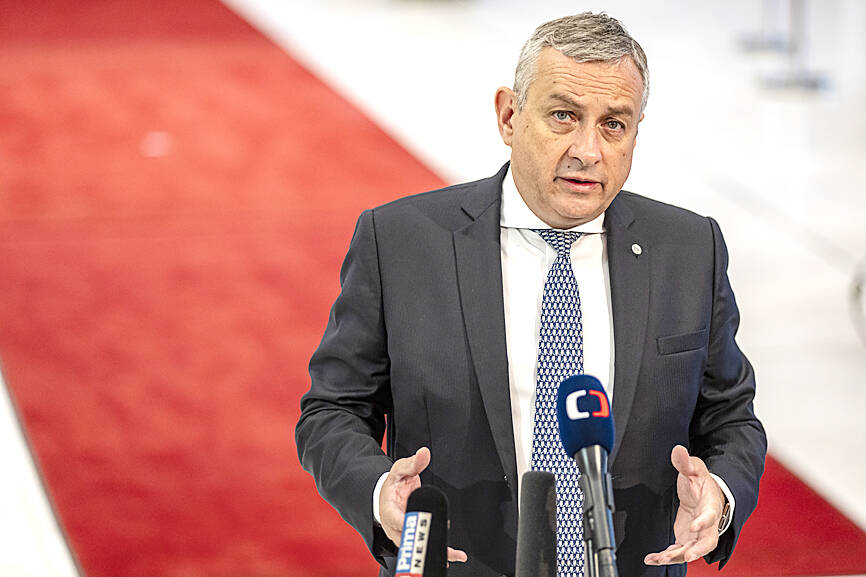EU member states yesterday announced the adoption of a mechanism that would bring the bloc’s industrial imports under environmental standards by charging for the carbon emissions linked to their production.
Known as the Carbon Border Adjustment Mechanism (CBAM), the agreement covers industrial imports from the regional bloc’s 27 member states, targeting the highest-polluting products first.
“CBAM will be a crucial pillar of European climate policies,” Mohammed Chahim, a member of the European Parliament from the Netherlands, said in a statement released by the parliament. “It is one of the only mechanisms we have to incentivize our trading partners to decarbonize their manufacturing industry.”

Photo: EPA-EFE
The rules would allow the EU to “apply the ‘polluter pays’ principle to our industry,” Chahim said.
The agreement will initially cover specific products in carbon-intensive sectors, including steel, cement, fertilizers, aluminum, electricity and hydrogen, the European Council said.
Indirect emissions would also be included in the regulation, the council said.
This means that in practice, the importer has to declare the emissions directly linked to the production process, and if these exceed the European standard, acquire an “emission certificate” at the price of carbon dioxide in the EU.
If a carbon market exists in the exporting country, the importer would only pay the difference.
Under the provisional agreement member states came to yesterday, a test period for the agreement is to begin in October, during which importing companies will have to report their carbon emission obligations.
The timetable for the actual implementation of the scheme, which will be gradual, depends on further talks later this week on the rest of the EU’s carbon market reform.
“The new bill will be the first of its kind,” the European Parliament said in a statement, adding that it was designed to comply with WTO rules to push back on accusations of protectionism.
“This mechanism promotes the import of goods by non-EU businesses into the EU which fulfill the high climate standards applicable in the 27 EU member states,” Czech Republic Minister of Industry and Trade Jozef Sikela said. “This will ensure a balanced treatment of such imports and is designed to encourage our partners in the world to join the EU’s climate efforts.”

South Korea’s equity benchmark yesterday crossed a new milestone just a month after surpassing the once-unthinkable 5,000 mark as surging global memory demand powers the country’s biggest chipmakers. The KOSPI advanced as much as 2.6 percent to a record 6,123, with Samsung Electronics Co and SK Hynix Inc each gaining more than 2 percent. With the benchmark now up 45 percent this year, South Korea’s stock market capitalization has also moved past France’s, following last month’s overtaking of Germany’s. Long overlooked by foreign funds, despite being undervalued, South Korean stocks have now emerged as clear winners in the global market. The so-called “artificial intelligence

NEW IDENTITY: Known for its software, India has expanded into hardware, with its semiconductor industry growing from US$38bn in 2023 to US$45bn to US$50bn India on Saturday inaugurated its first semiconductor assembly and test facility, a milestone in the government’s push to reduce dependence on foreign chipmakers and stake a claim in a sector dominated by China. Indian Prime Minister Narendra Modi opened US firm Micron Technology Inc’s semiconductor assembly, test and packaging unit in his home state of Gujarat, hailing the “dawn of a new era” for India’s technology ambitions. “When young Indians look back in the future, they will see this decade as the turning point in our tech future,” Modi told the event, which was broadcast on his YouTube channel. The plant would convert

‘SEISMIC SHIFT’: The researcher forecast there would be about 1.1 billion mobile shipments this year, down from 1.26 billion the prior year and erasing years of gains The global smartphone market is expected to contract 12.9 percent this year due to the unprecedented memorychip shortage, marking “a crisis like no other,” researcher International Data Corp (IDC) said. The new forecast, a dramatic revision down from earlier estimates, gives the latest accounting of the ongoing memory crunch that is affecting every corner of the electronics industry. The demand for advanced memory to power artificial intelligence (AI) tasks has drained global supply until well into next year and jeopardizes the business model of many smartphone makers. IDC forecast about 1.1 billion mobile shipments this year, down from 1.26 billion the prior

People stand in a Pokemon store in Tokyo on Thursday. One of the world highest-grossing franchises is celebrated its 30th anniversary yesterday.